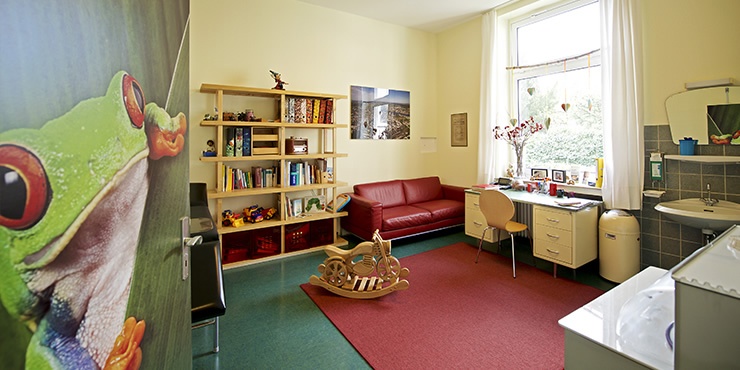
The treatment of acute diseases, especially infectious diseases, makes up a large part of the paediatric practice. Sorely afflicted children (e.g. ear pain) can, of course, be tested in practice on the day of your call.
The review of chronic diseases often requires more time and calmness. For this purpose, we provide longer-term appointments and schedule more time if necessary.
The preventative examinations take place in fixed time windows, which you find in the yellow notebook of your child. We are happy to schedule appointments for the U4 to U9 towards the end of the time frame. In this way, all children can be given the chance to meet all requirements at the time of the screening.
In our practice, U8 and U9 are carried out during two separate appointments: During the first appointment, a number of tests (seeing, listening, speaking, and drawing) are carried out with the children in the presence of the parents. During the second appointment, the results will be discussed together with Dr Gerschlauer, and a physical examination will be conducted. There will be time to address questions and any concerns.
If you plan to have a home birth and live in the Bonn area, we offer the U2 (3rd to the 10th day) as a house call. Please report to the practice immediately after the birth. Please have the midwife take a blood sample for metabolic screening (36th to 72nd hour of life).
An ultrasound screening of the infant’s hips is recommended at the age of about one month. If there is a family history of hip dysplasia or hip maturation retardation, an earlier examination is recommended.
After urinary tract/kidney infections, it is recommended to examine the child’s bladder and kidneys by ultrasound. This is, of course, free of pain and side effects and can also be carried out in our practice.
Vaccination is, of course, one of the tasks of a paediatrician. You will receive from us the information on the current vaccination recommendations of STIKO (vaccination committee), possible side effects, and available vaccines.
For many parents, the topic of vaccination is very stressful because they seem to be bombarded with information and opinions (both solicited and unsolicited) from all sides (e.g. grandparents, midwives, friends, neighbours, paediatricians, and the Internet). Especially when it comes to your first child, everyone else seems to know better.
Our tip: read in peace, avoid internet forums, and stay calm. Everyone ultimately comes to a decision.
At the U3, you will get some initial information on this topic and have enough time for questions.
In the context of the preventative examinations or in the case of suspected visual or hearing impairment, we carry out visual and hearing tests in the practice. In the case of uncertainties or abnormalities, you will of course be forwarded to an ENT specialist or ophthalmologist.
If an allergy is suspected, a “prick test” can be carried out in our practice. Various solutions of potential allergens are placed onto the lower arms of your child and administered to the skin using a small needle. After a few minutes, the result can be read on the basis of possible hives.
Alternatively, possible allergies can also be examined by means of a blood sampling.
We will discuss in advance which of the two tests is suitable for your child.
If your child suffers from an allergy (especially hay fever), hyposensitisation may be a good therapy option. Here, the body is accustomed through gradually increased dosages of the allergen (pollen, dust mite). A tolerance should develop, and the allergy symptoms should disappear. In addition, this should reduce the risk of your child developing bronchial asthma in later years.
The hyposensitisation is performed by subcutaneous injection into the back of the upper arms. Here, the skin is quite insensitive, and most children do not find the injection to be painful. The syringes are administered every four to six weeks for a period of three to five years.
Surgery hours
| Monday: | 8.30 – 12.00 | 14.00 – 17.00 |
| Tuesday: | 8.30 – 12.00 | 14.00 – 17.00 |
| Wednesday: | 8.30 – 12.00 | |
| Thursday: | 8.30 – 12.00 | 14.00 – 17.00 |
| Friday: | 8.30 – 12.00 |
Contact
Prinz-Albert-Str. 10
53113 Bonn
Telefon: (0228) 22 32 35
Telefax: (0228) 912 56 40
How to reach us
Emergency Service
Outside our office hours, you will get help for your sick child in the:
Kinder- und Jugendärztlichen Notfallpraxis
on the ground of the St.-Marien-Hospital
Robert-Koch-Str.1
53115 Bonn
Phone 0228/24 25 444
Surgery hours
Mon, Tue, Thu von 19:00 – 22:00
Wed, Fri 14:00 – 22:00Uhr
Sat, Sun, Holiday 8:30 – 22:00 Uhr
At night, you can contact the outpatient clinics of the paediatric clinics:
- St.-Marien-Hospital Bonn:
Phone 0228/505-2910 - Universitäts-Kinderklinik Bonn:
Phone 0228/2873-3333 - Asklepios-Kinderklinik St. Augustin:
Phone 02241/249-0


